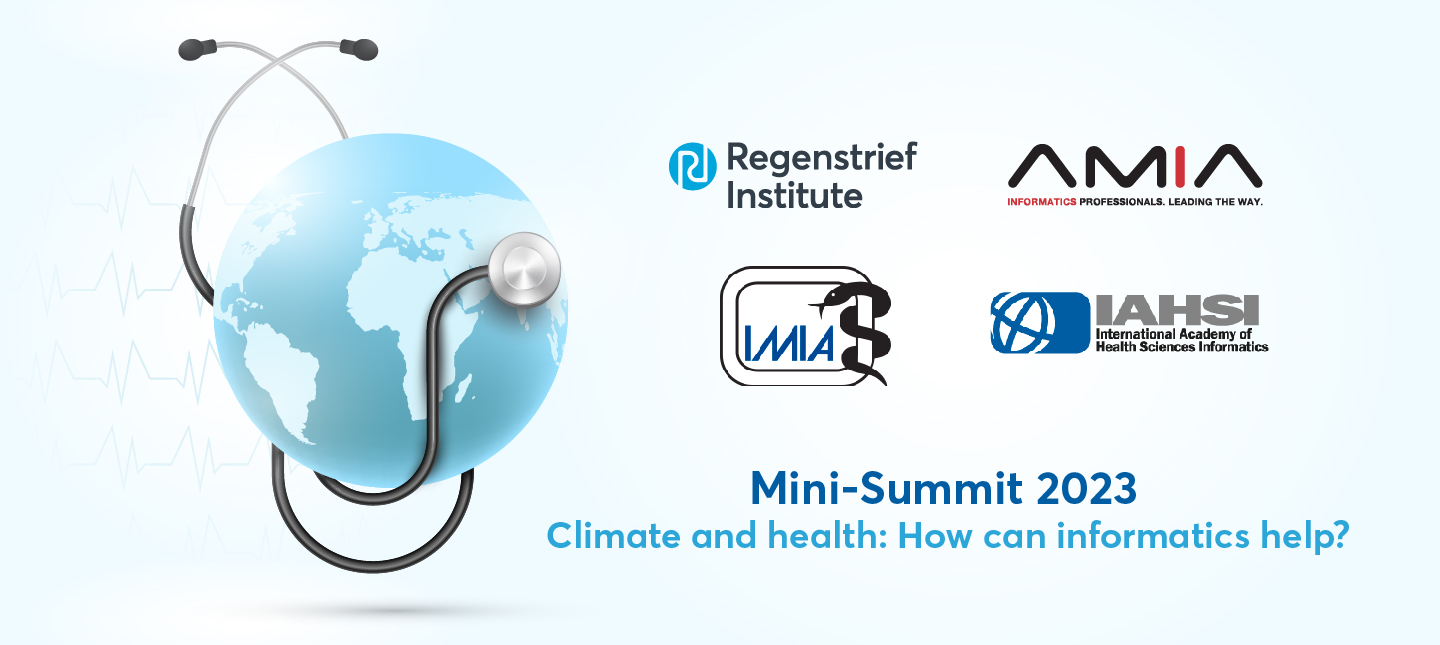Regenstrief Institute, the International Medical Informatics Association (IMIA), the International Academy of Health Sciences Informatics (IAHSI) and the American Medical Informatics Association (AMIA) are hosting a mini-summit at the AMIA 2023 Annual Symposium to address how informatics can help resolve health issues caused by climate change. The event will bring together national and international experts to form an informatics infrastructure that will highlight and bring exposure to climate change’s effects on health.
The event is Mini-Summit 2023 — Climate and health: How can informatics help? It is being planned because of the growing awareness around the effects of climate change on health. Fittingly, the AMIA 2023 Annual Symposium will be in Louisiana, a state drastically affected by multiple manifestations of climate change, including heat waves, droughts, wildfires and saltwater intrusion.
During the mini-summit, health informatics professionals will discuss lessons from current environmental challenges and the future of preparing for environmental disasters. Experts will present the challenges faced by healthcare and disaster responders to establish a discussion surrounding public health and healthcare system measures that could have been created to facilitate a more efficient response. Other attendees at the mini-summit are expected to be disaster response experts, climate change researchers, healthcare administrators and government officials, possibly from several different countries.
“Louisiana is like a kaleidoscope of climate change effects – all in the same place,” said Regenstrief Research Scientist Titus Schleyer, DMD, PhD. “People are affected by floods, wildfires, droughts, the (re)emergence of disease and risks to drinking water. We thought it would be good to have a conversation with the people in Louisiana about what informatics would have been able to do to either prevent some of the adverse effects or mitigate those adverse effects once they had happened.
“For so many years, there’s been discussion about the future consequences of not addressing climate change. That time is here. This phenomenon is affecting all of us – now – whether we recognize it or not. Our generation has an opportunity to get this right, and the window is closing. Health is something very uniquely connected to all of us. We all care about it. And here the question is very natural to ask: How can informatics help mitigate climate change in the context of health?” said Dr. Schleyer.
“Talented AMIA informaticians have applied data solutions to address a wide range of challenging, high-impact issues for decades,” said Tanya Tolpegin, MBA, CAE, chief executive officer for AMIA. “It’s exciting when these applied data solutions can be used to address large societal challenges, such as climate change. Understanding and addressing issues at the intersection of climate change and health requires data, as well as translating these data into information and insights. That is exactly the contribution that informaticians can and will make.”
Attendees will be asked about how public health and healthcare systems can better incorporate existing data systems and how to leverage these systems for better interagency communication and allocation of resources. There will be discussion on how health informatics can contribute to predicting, understanding, avoiding or mitigating the impacts of climate change on healthcare systems. Attendees will also be encouraged to share their thoughts on potential near-, medium- and long-term collaboration or project opportunities.
Titus K. Schleyer, DMD, PhD
In addition to his role as a research scientist with the Clem McDonald Center for Biomedical Informatics at Regenstrief Institute, Titus K. Schleyer, DMD, PhD, is the program director for learning health informatics at Regenstrief Institute and is a professor of biomedical informatics and a professor of medicine at Indiana University School of Medicine.
About Regenstrief Institute
Founded in 1969 in Indianapolis, the Regenstrief Institute is a local, national and global leader dedicated to a world where better information empowers people to end disease and realize true health. A key research partner to Indiana University, Regenstrief and its research scientists are responsible for a growing number of major healthcare innovations and studies. Examples range from the development of global health information technology standards that enable the use and interoperability of electronic health records to improving patient-physician communications, to creating models of care that inform clinical practice and improve the lives of patients around the globe.
Sam Regenstrief, a nationally successful entrepreneur from Connersville, Indiana, founded the institute with the goal of making healthcare more efficient and accessible for everyone. His vision continues to guide the institute’s research mission.
About AMIA
AMIA, the leading professional association for informatics professionals, is the center of action for 5,600 informatics professionals from more than 65 countries. As the voice of the nation’s top biomedical and health informatics professionals, AMIA and its members play a leading role in assessing the effect of health innovations on health policy and advancing the field of informatics. AMIA actively supports five domains in informatics: translational bioinformatics, clinical research informatics, clinical informatics, consumer health informatics, and public health informatics.
About International Medical Informatics Association (IMIA)
IMIA is the world body for health and biomedical informatics and an ‘association of associations’. IMIA provides informatics leadership and expertise to the multidisciplinary health-focused community and to policy makers, to enable the transformation of healthcare in accord with the world-wide vision of improving the health of the world population.
About IAHSI
IAHSI was established in 2017 through the auspice of IMIA, similar to other national academies of sciences. It seeks to nominate and elect those whose contributions in informatics are recognized internationally. The goal is to promote the dissemination of knowledge and best practices, foster new ideas, and encourage worldwide collaboration and sharing of expertise and resources.










